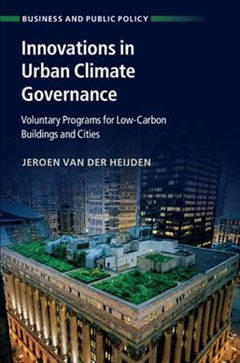
This course is designed for participants who have experience in qualitative or quantitative research and who are interested in applying qualitative comparative analysis (QCA) in their current or future studies. This is an introductory course, but participants are advised to make themselves familiar with the recommended literature before participating.
Professor Jeroen van der Heijden – With 20+ years of international research experience, Jeroen specializes in climate change solutions for urban environments, encompassing both mitigation and adaptation strategies. His journey includes an MSc in Architecture and Ph.D. in public administration from TU Delft (Netherlands) and academic roles at institutions worldwide, including professorships at the Australian National University (Australia), Amsterdam University (Netherlands), and the Victoria University of Wellington (New Zealand). He has authored over 80 peer-reviewed articles, 70 book chapters, and notable books on urban climate governance and action—many of which include applications of QCA.
Since 2007, he has been applying QCA in various research projects and has been teaching the method since 2017. More information on Jeroen’s work is available from www.jeroenvanderheijden.net.
Qualitative Comparative Analysis (QCA) provides a bridge between case-oriented and variable-oriented research methods. It is rapidly making inroads in the social sciences. This Course will introduce participants in:
(i) the basics of QCA—set-theory and Boolean algebra;
(ii) the various approaches to QCA—crisp set, multi value, and fuzzy set;
(iii) different QCA Applications;
(iv) current debates on and application of QCA; and,
(v) will challenge participants to develop their own QCA project.
The target audience for this course are researchers, practitioners and academics who have conducted at least one qualitative study, and are familiar with the process and context of qualitative research.
Day 1
Introductory session.
Epistemological foundations of QCA.
An easy example of QCA application by hand;
What can QCA be used for?
Introduction to QCA in 10 steps.
Day 2
Step 1: Why a QCA analysis for your study?
Step 2: Selection of outcomes and conditions.
Step 3: The number of conditions.
Step 4: Calibration of data
Day 3
Step 5: Raw data matrix.
Step 6: Analysis of necessary conditions. Design, apply, and present your own QCA research (afternoon).
Day 4
Step 7: Analysis of sufficient conditions – truth table. Intermezzo: working with negated data in QCA.
Step 8: Analysis of sufficient conditions – choice of the solution term.
Step 9: Presentation of results.
Step 10: Testing robustness and interpretation of results
Day 5
Further and future development of QCA as a method. Ongoing critique to QCA as a method. Design, apply, and present your own QCA research (afternoon).
This course will take place in a classroom. Participants are advised to bring a laptop.
Participants will be expected to have experience with at least one qualitative research project or have undertaken an introductory level course in qualitative research methods. While some discussion of the technical elements of methods is presented during the course of the workshop, participants should have a basic familiarity with data collection methods such as interviews, observation, and document analysis.
The instructor's bound, book length course notes will serve as the course text.
- Schneider, C. and C. Wagemann (2012). Set-Theoretic Methods for the Social Sciences. Cambridge, Cambridge University Press.
- van der Heijden, J. (2017). Innovations in Urban Climate Governance: Voluntary Programs for Low-Carbon Buildings and Cities. Cambridge, Cambridge University Press.
Other readings:
- Ragin, C. (2008). Redesigning Social Inquiry: Fuzzy Sets and Beyond. Chicago, Chicago University Press.
- Rihoux, B. and C. Ragin (2009). Configurational Comparative Analysis. London, Sage.
Q: Do I have to have had any qualitative research experience to do this course?
A: Yes, you will have been expected to have experience with at least one qualitative research project or have undertaken an introductory level course in qualitative research methods.
Q: Do I have to have had any experience with QCA to do this course?
A: No, but it is strongly recommended to familiarise yourself with the recommended texts before participating in this course; particularly Schneider and Wagemann (2012).
Q: I already have some experience with QCA. Will I get anything out of this introductory course?
A: You absolutely will. Dr
Professor Jeroen van der Heijden – With 20+ years of international research experience, Jeroen specializes in climate change solutions for urban environments, encompassing both mitigation and adaptation strategies. His journey includes an MSc in Architecture and Ph.D. in public administration from TU Delft (Netherlands) and academic roles at institutions worldwide, including professorships at the Australian National University (Australia), Amsterdam University (Netherlands), and the Victoria University of Wellington (New Zealand). He has authored over 80 peer-reviewed articles, 70 book chapters, and notable books on urban climate governance and action—many of which include applications of QCA.
Since 2007, he has been applying QCA in various research projects and has been teaching the method since 2017. More information on Jeroen’s work is available from www.jeroenvanderheijden.net.
A great overview and a good grounding in the logic of QCA, very useful to qual research in general (Summer 2018)
Very helpful presentation of a relatively complex method. Appreciated the time taken to address epistemology to work through method with someone with expertise rather than trying to self teach. (Summer 2018)
Gave an indepth look into QCA, learnt how to conduct rigorous QCA research. (Summer 2018)
Very good course I wish he had more courses to learn more in depth! (Summer 2017)
It was excellent! (Summer 2017)
The instructor's bound, book length course notes will serve as the course text.
